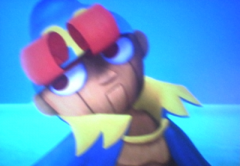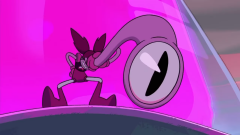Of course Microsoft, who commonly gets their name abbreviated as "M$" is gonna release a fan favorite retro game that they have total rights to, it's not even a question. On the flip side, I think the fact Nintendo has managed to re-release Mario RPG at all speaks volumes for its popularity and what Nintendo thinks about it as a legendary title, pun not intended. After the SNES era and up to recently, it isn't like Square and Nintendo have necessarily been on the friendliest terms, and I could see SE doing something petty like simply not letting them use a Mario game in which likely more than half of the content happens to be owned entirely by SE.
And as far as exposure goes, Mario RPG being one of the titles on the "must-have" SNES Mini is way more exposure than Microsoft's digital games or Rare Replay could ever offer, unless people were busting down the retail doors and paying twice retail value for an Xbox or Rare Replay on the secondary market. It's hard to beat the kind of rabid fan demand that Nintendo products bring to the table.
EDIT: Not to mention the kind of people who actually like Banjo weren't necessarily swooned away by the rest of the games Microsoft and their partners have to offer just because they held Banjo at knifepoint in a dark cellar, and likewise, the type of person who wants to play gritty first person action games with their friends online is likely not going to pick up a cartoonish collectathon with obnoxious, repetitive music.
How are you this engrossed in "console war bull****" in 2019? Calling Microsoft M$ and acting like people who play Xbox are only dude bros who only like shooters is not a good look in the least bit and isn't true either.
I also don't agree that it shows a whole lot. By 2008, Square Enix and Nintendo had been working together on pretty damn good terms for 6 years. It's a narrative I see peddled a lot, but realistically, Square Enix was releasing a lot of titles on Nintendo's portable consoles and were one of the strongest third party supporters of the GBA/DS era. Nintendo just hasn't had a console powerful enough to accommodate their major titles (which traditionally have run not great on other consoles) as well. They're businesses that realize the benefits of working together, and even in Japan where things may be taken more seriously, Nintendo generally understands how much they were in the wrong in that era.
I hear this a lot. What the hell happened between Nintendo and Square after SMRPG?
Nintendo went into the 1990s with an impossibly large hubris and proceeded to get hit with huge amounts of karma for it. Nintendo was an extremely rigid company in the NES/SNES era that demanded their way or the highway. They limited how many games publishers could release in a single year, they forced all content to meet their personal guidelines for content (which was strict and somewhat draconian in how much content they wouldn't allow, not just hyper violence or pornographic types of content, but references to religion or things that were too political too), and it cost a pretty penny to produce for Nintendo. Some of this had been necessary measures for revitalizing consumer confidence in the US video game market in the mid-1980s... but their policies were not the most popular. These guidelines weren't as strict in Japan mind you, but they earned a pretty ruthless reputation all the same and still didn't always get along super well with third parties.
I could get into this a whole lot more (I have written a longer academic paper on this time period if you're interested haha). But Nintendo just kept pushing harder and harder with things like lawsuits and even (allegedly) instigating the US Senate hearings on adult and violent content in video games (specifically in opposition to Sega who was much more free with their products and were becoming a serious competitor to Nintendo's market share at the time). Eventually Nintendo partnered with Sony to make a CD add-on for the SNES, but got cold feet about the add-on and the rights to those games potentially lying more with Sony than they were comfortable with, so they backed out. Sony took that technology and made the Playstation and offered a much more open, modern, and friendly alternative to Nintendo and Sega. Nintendo then drug their feet on getting the N64 out (a full year after the PS1) and went with cartridges because they could maintain their usual control over the industry with owning all the production, they could load faster than CDs, and they were harder to pirate. The trade-off was that these cartridges couldn't hold much data and couldn't hold higher quality video and music most of the time. Square Enix had an ambitious project plan for Final Fantasy VII... but Nintendo's console wasn't up to the task. The N64-DD was a disk based add-on that Nintendo was developing, but still wasn't remotely close to being ready in time for Square's game.
Square Enix was frustrated with Nintendo and they jumped ship to Sony at that point. They didn't want their ambition to be stifled and like I said, Nintendo had not been popular during the 80s and 90s. Nintendo naturally was extremely upset and basically threw a fit that put them on rough terms for the rest of the N64's lifecycle. That's generally how Nintendo lost all their third party support. Years of mistreating them and holding them to standards the companies didn't agree with meant lots of developers/publishers were very willing to jump ship when the going got rough for Nintendo. And they absolutely messed up with the N64 and gave a huge amount of the video game market share to Sony's PS1. It was clear the PS1 was going to be a success and could handle the more ambitious video based projects of the time (even though the N64 was more powerful overall), so they took their business to the more successful and cheaper to produce for PS1.
Nintendo more or less holds most of the blame for splintering their relationship with third parties, and Square Enix was one of the huge ones, especially once Final Fantasy VII proved to be a massive hit on Sony's console in a way that it never had been on the SNES.



